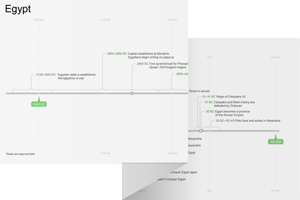12:1–16 The Chronicler’s report of Shishak’s attack on Jerusalem differs from the account in 1 Kgs 14:21–28. It includes details about Rehoboam humbling himself and God relenting from destroying Jerusalem (2 Chron 12:5–8). It also largely downplays Rehoboam’s sin (see note on v. 1). |
12:1 he forsook the law of Yahweh Rehoboam stopped following the law of Moses after faithfully following the examples of David and Solomon for three years (11:17 and note).
12:2 for they had acted unfaithfully against Yahweh The Chronicler makes it clear that Shishak’s attack is a direct result of Rehoboam’s unfaithfulness.
Shishak First king of the 22nd Dynasty of Egypt (reigned circa 931–910 bc). Shishak had harbored Jeroboam after Solomon sought to kill him (1 Kgs 11:40).
12:4 And he took the fortified cities that belonged to Judah Rehoboam had fortified the cities surrounding Jerusalem (2 Chron 11:5–12). However, Shishak was still able to take them.
12:5 I myself have surely abandoned you By abandoning God’s law, Rehoboam abandoned God Himself (see v. 1 and note). Because of this, God abandoned Rehoboam. This result is in line with David’s warning to Solomon (see 1 Chr 28:9).
12:6 Yahweh is righteous Recognizing their sin, Rehoboam and the leaders of Israel humble themselves and acknowledge that God is just in punishing them.
12:7 I will not destroy In relenting from punishing Rehoboam, God fulfills the promise He made to Solomon (2 Chron 7:12–18). This message of God’s mercy after repentance would have resonated with the Chronicler’s audience of returned exiles.
12:8 they might know my service God allows Rehoboam to suffer some consequences for abandoning the law (see Deut 28:47–50).
12:9 He took everything Since Shishak did not take Jerusalem, it is likely that Rehoboam bought him off with a large, one-time tribute payment.
the small shields of gold that Solomon had made See 2 Chron 9:16 and note.
12:10 into the hand of the commanders of See 1 Kgs 14:27 and note.
12:11 the alcove of the guards See 1 Kgs 14:28 and note.
12:12 And when he humbled himself The Chronicler emphasizes that Rehoboam avoided the complete destruction of Jerusalem by humbling himself before God.
12:13 and he reigned seventeen years in Jerusalem See note on 2 Chron 9:30.
the name of his mother was Naamah the Ammonite See 1 Kgs 14:21 and note.
12:14 to seek Yahweh The importance of seeking God is a recurring theme in 1–2 Chronicles; see note on 2 Chron 11:16.
12:15 the words of Rehoboam from the first to the last A common epitaph for deceased kings (see 1 Kgs 11:41; 14:19).
they not written See note on 2 Chron 9:29.
the chronicles of Shemaiah the prophet This source was apparently information recorded by or about Shemaiah the prophet (11:2; 12:5–7).

|
About Faithlife Study BibleFaithlife Study Bible (FSB) is your guide to the ancient world of the Old and New Testaments, with study notes and articles that draw from a wide range of academic research. FSB helps you learn how to think about interpretation methods and issues so that you can gain a deeper understanding of the text. |
| Copyright |
Copyright 2012 Logos Bible Software. |
| Support Info | fsb |
 Loading…
Loading…

